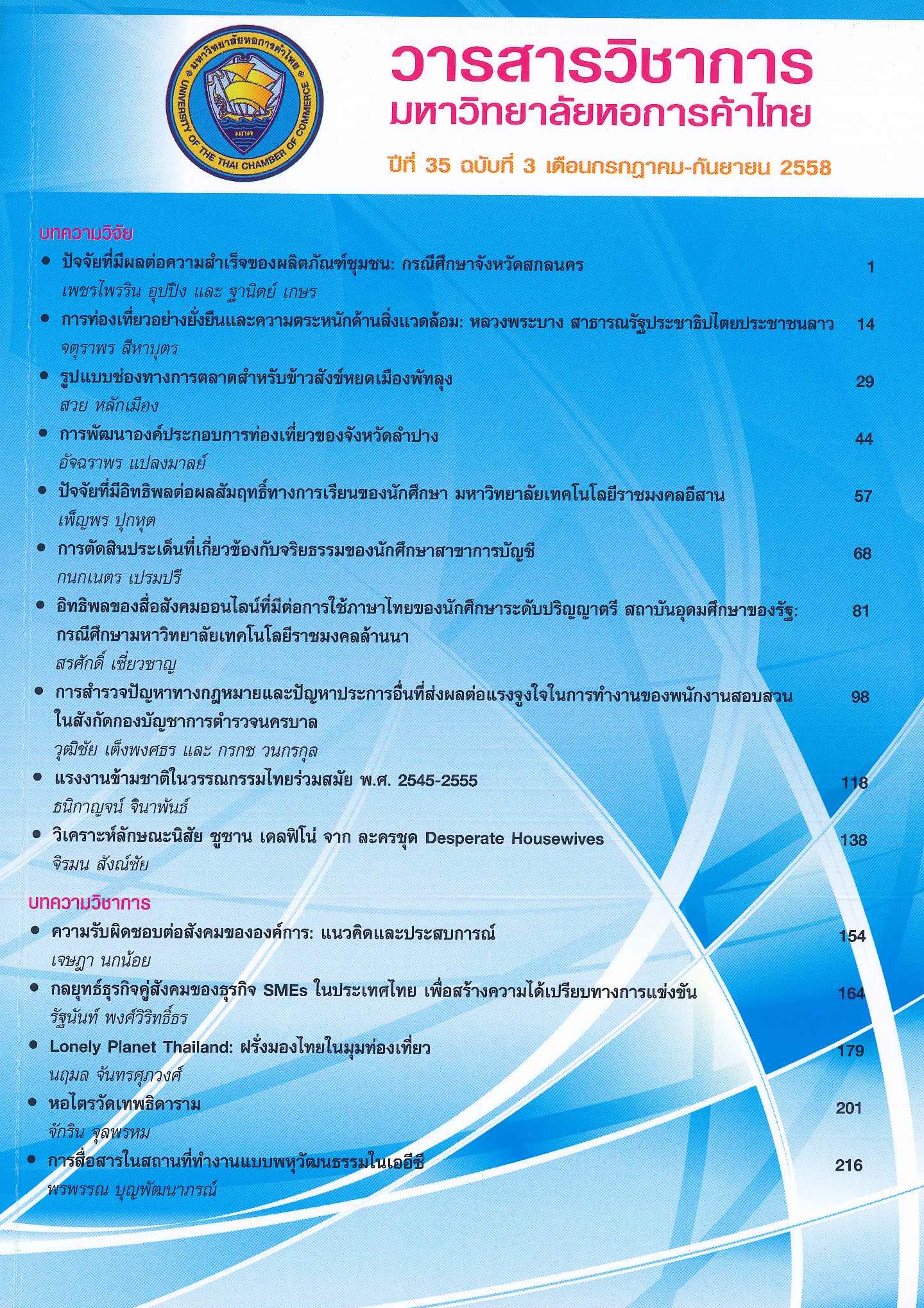Influences of Social Media on Thai Usage of Undergraduate Students at Public Higher Education Institutions: A Case Study at Rajamangala University of Technology Lanna
Main Article Content
Abstract
The aim of this research was to study the opinions of students towards the use of Thai language in social media and the influences of social media on the use of Thai language. The sample were 384 students from 6 campuses of Rajamangala University of Technology Lanna. The instrument was a questionnaire. The data was analyzed by means of percentage, mean, standard deviation and descriptive analysis. The results showed that there was a high level of misspelled words in the use of Thai language in social media. Furthermore, the students believed that social media had influenced the use of their language in terms of slang. They indicated that it was easier to communicate using slang, or words taken from social media, among the same age interlocutors. In terms of the influences of social media on the use of Thai language, the results showed that social media had influenced the students’ writing and speaking ability at a high level. They employed misspelled words and slang from social media to write they applied slang and transliterations to speech. The students viewed the use of Thai language in social media as temporary; that it would remain for a period of time and constantly change.
Article Details

This work is licensed under a Creative Commons Attribution-NonCommercial-NoDerivatives 4.0 International License.
ลิขสิทธิ์ของบทความ
ผลงานที่ได้รับการตีพิมพ์ถือเป็นลิขสิทธิ์ของมหาวิทยาลัยหอการค้าไทย ห้ามมิให้นำเนื้อหา ทัศนะ หรือข้อคิดเห็นใด ๆ ของผลงานไปทำซ้ำ ดัดแปลง หรือเผยแพร่ ไม่ว่าทั้งหมดหรือบางส่วนโดยไม่ได้รับอนุญาตเป็นลายลักษณ์อักษรจากมหาวิทยาลัยหอการค้าไทยก่อน
References
สุวรรณี อัศวดุลชัย. 2556. “การประเมินพฤติกรรมการใช้โทรศัพท์เคลื่อนที่ของวัยรุ่นในกรุงเทพมหานคร.” วารสารวิชาการ มหาวิทยาลัยหอการค้าไทย 33. 3: 184-191.
Chittmittrapap, Anusra. 2013. Online Media: The Derivation of Distorted Language [Online]. Available: https://www.dailynews.co.th/Content/IT/188341 (in Thai).
อานุสรา จิตต์มิตรภาพ. 2556. สื่อออนไลน์ ที่มาของภาษาเพี้ยน [ออนไลน์]. เข้าถึงจาก: https://www.dairynews.co.th/Content/IT/188341
Cholvisoot, Tatpicha. 2010. The Study of Language Usage for Communication via www.pantip.com for Developing the Understanding in Mass Media Language Course. Lampang: Lampang Rajabhat University. (in Thai).
ทัตพิชา ชลวิสูตร. 2553. การศึกษาการใช้ภาษาสื่อสารในเว็บไซต์ www.pantip.com เพื่อพัฒนาความเข้าใจในรายวิชาภาษาสื่อมวลชน. ลำปาง: มหาวิทยาลัยราชภัฏลำปาง.
Cyrstal, David. 2010. How is the Internet Changing Language Today? [Online]. Available: https://www.youtube.com/watch?v=P2XVdDSJHqY
Friedkin, Noah E., and Johnsen, Eugene C. 1999. “Social Influence Network and Opinion Change.” Advance in Group Processes 16: 1-29.
Kongrach, Panuwat. 2011. “Study of Teenagers’ Behaviors in Using Social Networking Sites (SNSs) in Thailand : A Case Study of Facebook.” Master’s thesis, Faculty of Technology Management, Graduate School, Thammasat University. (in Thai).
ภานุวัฒน์ กองราช. 2554. “การศึกษาพฤติกรรมการใช้เครือข่ายสังคมออนไลน์ของวัยรุ่นในประเทศไทย: กรณีศึกษา Facebook.” วิทยานิพนธ์ปริญญาบัณฑิต สาขาการบริหารเทคโนโลยี บัณฑิตวิทยาลัย มหาวิทยาลัยธรรมศาสตร์.
Malisuwan, Sertapong. 2009. Social Network : Case Study YouTube, Online Video Media to Create or to Destroy [Online]. Available: https://www.krukad.com/drupal/node/314 (in Thai).
เศรษฐพงศ์ มะลิสุวรรณ. 2552. เครือข่ายสังคม (Social Network): กรณีศึกษา ยูทูบ (YouTube) วิดีโอออนไลน์ สื่อเพื่อสร้างสรรค์หรือเพื่อทำลายล้าง [ออนไลน์] เข้าถึงจาก: https://www.krukad.com/drupal/node/314
Mingsiritham, Kemmanat. 2013. “Social Media Creative Media for Education.” Veridian E-Journal, Su. 6, 1: 72-81.
(in Thai).
เขมณัฏฐ์ มิ่งศิริธรรม. 2556. “Social Media สื่อสร้างสรรค์เพื่อการศึกษา.” Veridian E-Journal, Su. 6, 1: 72-81.
Nakhonthap, Amornwit . 2013, March 3. “Are teenagers in Thailand aggressive?” MatichonOnline [Online newspaper]. Available: https://www..matichon.co.th/news_detail.php?newsid=1362300593&grpid=&catid=19&subcatid=1904 (in Thai).
อมรวิชช์ นาครทรรพ. 3 มีนาคม 2556. “วัยรุ่นไทยก้าวร้าวจริงหรือ.” มติชนออนไลน์ [หนังสือพิมพ์ออนไลน์]. เข้าถึงจาก: https://www.matichon.co.th/news_detail.php?newsid=1362300593&grpid=&catid=19&subcatid=1904
Nitipornmongkhon,Panicha. 2012. Social Networks Usage of Working People in Bangkok [Online]. Available: www.spu.ac.th/commarts/files/2012/07/Article-Panicha pdf (inThai).
ปาณิชา นิติพรมงคล. 2555. พฤติกรรมการใช้เครือข่ายสังคมออนไลน์ของคนวัยทำงานในเขตกรุงเทพมหานคร [ออนไลน์]. เข้าถึงจาก: www.spu.ac.th/commarts/files/2012/07/บทความ-ปณิชา.pdf
Phon-ngarm, Patthira. 2001. Need of Graduate Students and Their Satisfaction with Teaching and Learning Process at Graduate School in Rajabhat Institute Loei. Bangkok: National Research Council of Thailand. (in Thai).
ภัทราธิรา ผลงาม. 2544. ความพึงพอใจและความต้องการของนักศึกษาบัณฑิตศึกษาต่อกระบวนการจัดการเรียนการสอนระดับบัณฑิตศึกษาสถาบันราชภัฏเลย. กรุงเทพมหานคร: สำนักงานคณะกรรมการวิจัยแห่งชาติ.
Saengchan, Bussayamas. 2012. “Behavior and Attitude of Teenagers in Bangkok toward Chat Language.” Independent study. Faculty of Public Relation, Graduate School, Sripatum University. (in Thai).
บุษยมาส แสงจันทร์. 2555.”พฤติกรรมและทัศนคติต่อการใช้ภาษาแชทของวัยรุ่นในเขตกรุงเทพมหานคร.” การศึกษาค้นคว้าอิสระ ปริญญามหาบัณฑิต สาขาวิชาการประชาสัมพันธ์ บัณฑิตวิทยาลัย มหาวิทยาลัยศรีปทุม.
Siam Technology College. Institute of Technology Research Internet Poll. 2012. Slang Usage and Teenage Vocabulary Words in Thai [Online]. Available: www.prd.go.th/ewt_dl_link.php?nid=5172 (in Thai).
วิทยาลัยเทคโนโลยีสยาม. สำนักวิจัยเทคโนโลยีอินเทอร์เน็ตโพล. 2555. การใช้คำศัพท์แผลงและคำศัพท์วัยรุ่นในกลุ่มเยาวชนไทย [ออนไลน์]. เข้าถึงจาก: www.prd.go.th/ewt_dl_link.php?nid=5172
Sujjapun, Ruenruthai. 2006. Aesthetic of Literature. Bangkok: Napetch. (in Thai).
รื่นฤทัย สัจจพันธุ์. 2549. สุนทรียรสแห่งวรรณคดี. กรุงเทพมหานคร: ณ เพชร.
Tangteekarak, Suwanna. 2008. “Using the Internet Language as a Teaching Medium.” BU Academic Review 7, 2: 62-72. (in Thai).
สุวรรณา ตั้งทีฆะรักษ์. 2551. “การใช้ภาษาไทยในอินเทอร์เน็ตเป็นสื่อการสอน.” BU Academic Review 7, 2: 62-72.
Tanthawichian, Piya. 2012. Thailand Internet Snapshot 2011. Bangkok: Internet Innovation Research Center. (in Thai).
ปิยะ ตัณฑวิเชียร. 2555. Thailand Internet. Snapshot 2011. กรุงเทพมหานคร: ศูนย์วิจัยนวัตกรรมอินเทอร์เน็ตไทย.
Tarnoi, Khwanwith. 2010. “Usage Behavior of Online Social Network of Undergraduate Students, Rajamangala University of Technology Thanyaburi.” Master’s thesis, Faculty of Information System, Graduate School, Rajamangala University of Technology Thanyaburi. (in Thai).
ขวัญวิทย์ ตาน้อย. 2553. “พฤติกรรมการใช้งานเครือข่ายสังคมออนไลน์ของนักศึกษาระดับปริญญาตรี มหาวิทยาลัยเทคโนโลยีราชมงคลธัญบุรี.” วิทยานิพนธ์ปริญญาบัณฑิต สาขาวิชาระบบสารสนเทศ บัณฑิตวิทยาลัยมหาวิทยาลัยเทคโนโลยีราชมงคลธัญบุรี.
Thailand. National Statistical Office. n.d. Thai Language in the cyber Age [Online]. Available: https://service.nso.go.th/nso/web/article/article_24html (in Thai).
สำนักงานสถิติแห่งชาติ. ม.ป.ป. ภาษาไทย...ในยุคไซเบอร์ [ออนไลน์]. เข้าถึงจาก: https://service.nso.go.th/nso/web/article/article_24html
Tothong, Amorn. 2012. “Internet Usage Behaviors and The Impact of Using Internet Via Mobile Phones among Youths in Bangkok.” Master’s thesis, Faculty of Science Education, Graduate School, King Mongkut’s University of Technology North Bangkok. (in Thai).
อมร โต๊ะทอง. 2555. “พฤติกรรมและผลกระทบจากการใช้อินเทอร์เน็ตผ่านโทรศัพท์เคลื่อนที่ของวัยรุ่นในเขตกรุงเทพมหานคร.” วิทยานิพนธ์ปริญญามหาบัณฑิต สาขาวิชาการศึกษาวิทยาศาสตร์ บัณฑิตวิทยาลัย สถาบันเทคโนโลยีพระจอมเกล้าพระนครเหนือ.
Worapong, Kantipa. 2005. “Language Used on the Webboards by Students in Secondary Schools.” Master’s thesis, Faculty of Applied Linguistics, Graduate School, Kasetsart University. (in Thai).
กานติภา วรพงษ์. 2548. “การใช้ภาษาไทยในเว็บบอร์ดของนักเรียนระดับมัธยมศึกษา.” วิทยานิพนธ์ปริญญามหาบัณฑิต สาขาวิชาภาษาศาสตร์ประยุกต์ บัณฑิตวิทยาลัยมหาวิทยาลัยเกษตรศาสตร์.


